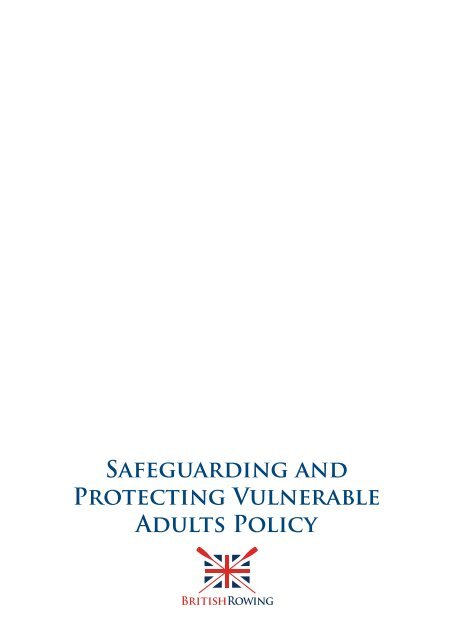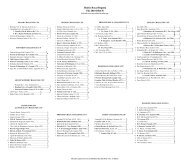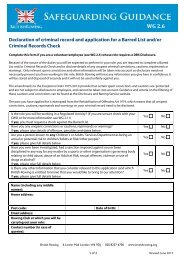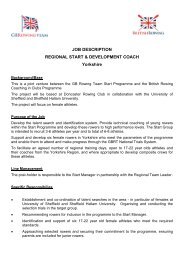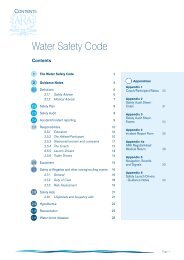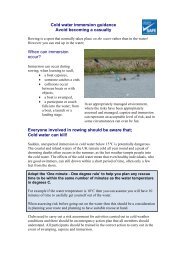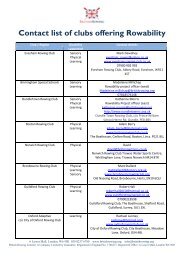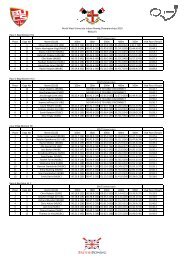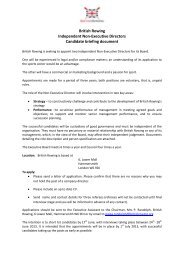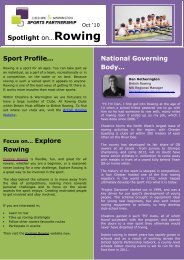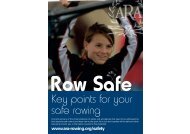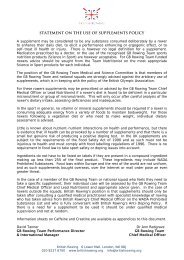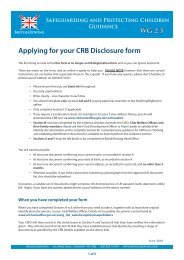British Rowing Safeguarding and Protecting Vulnerable Adults Policy
British Rowing Safeguarding and Protecting Vulnerable Adults Policy
British Rowing Safeguarding and Protecting Vulnerable Adults Policy
Create successful ePaper yourself
Turn your PDF publications into a flip-book with our unique Google optimized e-Paper software.
<strong>Safeguarding</strong> <strong>and</strong><strong>Protecting</strong> <strong>Vulnerable</strong><strong>Adults</strong> <strong>Policy</strong>
<strong>British</strong> <strong>Rowing</strong><strong>Safeguarding</strong> <strong>and</strong><strong>Protecting</strong> <strong>Vulnerable</strong><strong>Adults</strong> <strong>Policy</strong>Contents1 <strong>Safeguarding</strong> <strong>and</strong> <strong>Protecting</strong> <strong>Vulnerable</strong> <strong>Adults</strong> <strong>Policy</strong>1.1 General principles1.2 Scope1.3 Why these policies are needed1.4 <strong>Policy</strong> statement2 Good practice, poor practice <strong>and</strong> abuse2.1 Introduction2.2 Good practice2.3 Poor practice2.4 Abuse2.4.1 Indicators of abuse2.4.2 Degrees of abuse2.4.3 Types of abuse2.4.3.1 Neglect <strong>and</strong> acts of omission2.4.3.2 Physical abuse2.4.3.3 Sexual abuse2.4.3.4 Psychological abuse2.4.3.5 Financial or material abuse2.4.4 Bullying2.4.4.1 <strong>British</strong> <strong>Rowing</strong> Anti-Bullying <strong>Policy</strong>2.4.4.2 Why is it important to respond to bullying?2.4.4.3 Signs <strong>and</strong> symptoms3 Responding to suspicions <strong>and</strong> allegations of abuse3.1 Introduction3.2 Receiving evidence of possible abuse3.3 Recording information: confidentiality <strong>and</strong> information sharing3.4 Reporting the concern3.4.1 Involving parents or carers3.4.3 Involving <strong>British</strong> <strong>Rowing</strong>3.4.4 Involving statutory agencies4 Allegations of previous abuse5 <strong>Safeguarding</strong> vulnerable adults in the club5.1 Club Welfare Officer (CWO)5.2 Codes of Conduct5.3 Changing rooms5.4 Coaching ratios5.5 Local <strong>Safeguarding</strong> <strong>Vulnerable</strong> <strong>Adults</strong> Boards5.6 Regulated Activity Providers <strong>and</strong> ISA referralsPg 1<strong>British</strong> <strong>Rowing</strong> <strong>Safeguarding</strong> <strong>and</strong> <strong>Protecting</strong> <strong>Vulnerable</strong> <strong>Adults</strong> <strong>Policy</strong> - October 2010
Contents6 Designated persons with responsibility for safeguarding vulnerable adults in rowing6.1 The Club Welfare Officer6.1.1 Responsibilities6.1.2 Role6.2 <strong>British</strong> <strong>Rowing</strong> Child Protection Officer (CPO)6.2.1 Responsibilities6.2.2 Role6.3 Case Management Group (CMG)6.3.1 Responsibilities6.3.2 Role7 Recruiting <strong>and</strong> selecting people to work with vulnerable adults7.1 Controlling access to children7.2 Who should be CRB checked?8 Awareness <strong>and</strong> training8.1 Training for staff <strong>and</strong> volunteers8.2 Recommended levels of awareness <strong>and</strong> training8.3 Training9 Complaints <strong>and</strong> disciplinary procedures10 Implementation <strong>and</strong> monitoring procedures11 Guidance documentsCopyright © <strong>British</strong> <strong>Rowing</strong> Limited 2010All rights reserved. No part of this publication may be reproduced, sorted in a retrieval system or transmitted in any form by any means, electronic,mechanical, photocopying, recording or otherwise without the prior written permission of <strong>British</strong> <strong>Rowing</strong>.AcknowledgementsMany people <strong>and</strong> organisations have been generous with their time <strong>and</strong> work in helping us produce this policy <strong>and</strong> the various supplementary guidance documents.In particular: Amateur Swimming Association, <strong>British</strong> Water Ski, Children Count, Child Protection in Sport Unit (CPSU), Engl<strong>and</strong> & Wales Cricket Board, Snowsport UK,sportscoach UK (code of conduct) <strong>and</strong> all the staff <strong>and</strong> volunteers at <strong>British</strong> <strong>Rowing</strong> who have had a huge input.<strong>British</strong> <strong>Rowing</strong> <strong>Safeguarding</strong> <strong>and</strong> <strong>Protecting</strong> <strong>Vulnerable</strong> <strong>Adults</strong> <strong>Policy</strong> - October 2010Pg 2
GlossaryTermAbuse See section 2.4.Definition / ExplanationAdultAdvocateA person of or over the age of 18 years.An individual who speaks on behalf of, or represents the interests of, the vulnerable adultwhere appropriate.Child (ren) Anyone under the age of 18.Child Protection in Sport Unit (CPSU)The CPSU team is sited within the National Society for the Prevention of Cruelty to Children(NSPCC) <strong>and</strong> was established with joint funding from Sport Engl<strong>and</strong>.Child Protection Officer (CPO) <strong>British</strong> <strong>Rowing</strong> officer whose responsibilities are explained in Section 5.3.Child Protection Case Manager (CPCM) Individual within <strong>British</strong> <strong>Rowing</strong> whose responsibilities are explained in Section 5.2.Children <strong>and</strong> <strong>Vulnerable</strong> <strong>Adults</strong> Social CareServicesClub Welfare Officer (CWO)Criminal Records Bureau (CRB)Duty of CareIndependent <strong>Safeguarding</strong> AuthorityLocal Protection of <strong>Vulnerable</strong> <strong>Adults</strong>Committee (LPVAC)Parent/CarerPersonnelPosition of trustRegistered BodyThe Local Authority statutory agency with responsibility for safeguarding <strong>and</strong> protectingchildren <strong>and</strong> families, formerly known as Social Services.The designated individual within a <strong>British</strong> <strong>Rowing</strong> affiliated club whose responsibilities areexplained in Section 4.1.Administrators who check on behalf of the Home Office for ‘Registered Bodies’.The duty that rests upon an individual or organisation to ensure that all reasonable stepsare taken to ensure the safety of any person involved in an activity for which that individualor organisation is responsible (WG 3.1).Independent <strong>Safeguarding</strong> Authority (ISA), established under the <strong>Safeguarding</strong> <strong>Vulnerable</strong>Groups Act 2006, to administer the Vetting <strong>and</strong> Barring Scheme.These <strong>Vulnerable</strong> Adult protection committees have responsibility for the co ordinationof work undertaken by agencies involved both in providing services <strong>and</strong> safeguardingvulnerable adults. LVAPCs provide local inter-agency guidelines detailing procedures forcases of actual or suspected abuse. Some areas have established sports sub-groups toinform their work. There are similar structures for children called Local <strong>Safeguarding</strong>Children’s Boards (LSCBs).A generic term which includes parents, carers <strong>and</strong> guardians.Employees of <strong>British</strong> <strong>Rowing</strong> <strong>and</strong> its affiliated clubs, or facilities used in rowing as well asvolunteers <strong>and</strong> all participants in the sport of rowing.This is where an individual, such as a coach, teacher, or club officer who makes decisions foror about a child, can influence the child’s actions <strong>and</strong> may misuse that position to groom orabuse the child. This position can be a positive one, in building confidence <strong>and</strong> self-esteemin children.An organisation such as <strong>British</strong> <strong>Rowing</strong> that is able to act as recipient of CRB information onbehalf of its members.Pg 3<strong>British</strong> <strong>Rowing</strong> <strong>Safeguarding</strong> <strong>and</strong> <strong>Protecting</strong> <strong>Vulnerable</strong> <strong>Adults</strong> <strong>Policy</strong> -October 2010
Regulated ActivityRegulated Activity (RA) involves contact with vunerable groups <strong>and</strong> is:Of a specific nature eg. training, teaching, supervising, advice, treatments ortransport provided for the purposes of the activityOrIn a specified place eg. schools, children’s homes <strong>and</strong> hospitals, juvenile detentionfacilities, adult care homes.AndOccurs once a week or moreAnd/orOccurs on four or more occasions in a 30 day periodAnd/orOccurs overnight between 2am <strong>and</strong> 6am.Regulated Activity ProviderRisk assessmentThe person or organisation responsible for employing or deploying workers to facilitate anactivity, whether these workers are paid or unpaid. See WG 2.9.A procedure to help identify possible sources of danger <strong>and</strong> take appropriate action tominimise these risks taking into account the age, number <strong>and</strong> competence of participants.See <strong>British</strong> <strong>Rowing</strong>’s RowSafe guide for examples.Rower<strong>Safeguarding</strong> <strong>Vulnerable</strong> Groups Act 2006Significant Access<strong>Vulnerable</strong> AdultGeneric term to include every rower, sweep-oar or sculler, cox or indoor rower.Established ISA <strong>and</strong> VBS to protect children <strong>and</strong> vulnerable adults.Being in a position to have regular <strong>and</strong> direct contact with children/vulnerable adultswhether as a volunteer or employee (see ‘Position of Trust’).A person, 18 years or over, who is or may be in need of community care services by reasonof mental or other disability, age or illness <strong>and</strong> who is or may be unable to take care of himor herself, or unable to protect him or herself against significant harm or exploitation.No Secrets- definition based on that set out in the 1997 Consultation paper: “WhoDecides?” Issued by the Lord Chancellor’s Department.In respect of sporting activity a person is regarded as a vulnerable adult under the Vetting<strong>and</strong> Barring Scheme when they are:• Receiving any form of medical care or therapy, such as being treated bya physiotherapist• Receiving a service or participating in an activity that is specifically targeted atpeople with age-related needs or disabilities.Welfare of the child is paramountWGVetting <strong>and</strong> Barring SchemeThis is a key principle of the Children Act 1989. It means that the needs of children overridethose of the adults working with them.Welfare Guidance documents, detailed in Section 10, <strong>and</strong> available to download from the<strong>British</strong> <strong>Rowing</strong> website www.britishrowig.org/welfareThe Vetting <strong>and</strong> Barring Scheme (VBS) is a registration scheme administered by the ISA thatidentifies those people who may work in a regulated activity <strong>and</strong> who are not barred fromworking with children or vulnerable adults.<strong>British</strong> <strong>Rowing</strong> <strong>Safeguarding</strong> <strong>and</strong> <strong>Protecting</strong> <strong>Vulnerable</strong> <strong>Adults</strong> <strong>Policy</strong> - October 2010Pg 4
1. <strong>Safeguarding</strong> <strong>and</strong><strong>Protecting</strong> <strong>Vulnerable</strong><strong>Adults</strong> <strong>Policy</strong>1.1 General principles• Everyone who participates in rowing is entitled to do so in a safe <strong>and</strong> enjoyable environment.• All <strong>British</strong> <strong>Rowing</strong> clubs, competitions <strong>and</strong> associated individuals must follow the policies defined in this document.• <strong>British</strong> <strong>Rowing</strong> is committed to helping everyone in rowing accept their responsibility to safeguard vulnerable adults from harm<strong>and</strong> abuse <strong>and</strong> support them to do so.• This document sets out the procedures you need to follow to protect vulnerable adults <strong>and</strong> what you need to do if you have anyconcerns.1.2 ScopeThese policies apply to all rowers, coaches, volunteers, employees <strong>and</strong> anyone involved in rowing, whether or not they are <strong>British</strong> <strong>Rowing</strong>members. All these people have a duty of care to safeguard the welfare of vulnerable adults <strong>and</strong> prevent their abuse.1.3 Why these policies are needed<strong>British</strong> <strong>Rowing</strong> has realised the need for an individual policy for vulnerable adults, in line with the considerations of the DisabilityDiscrimination Act 2005, to promote equal opportunities <strong>and</strong> provide a clearer framework for those who suffer from physical, mental health<strong>and</strong> learning disabilities.<strong>Vulnerable</strong> people are at heightened risk of abuse <strong>and</strong> discrimination because of their susceptibility <strong>and</strong> many experience this in all walksof life. Practice has shown that vulnerable people who are victims of abuse in the sports setting can be reluctant to report their experiencesfor fear of losing a positive <strong>and</strong> important part of their lives. Therefore it is essential that <strong>British</strong> <strong>Rowing</strong>, as a national governing body, <strong>and</strong>its associated clubs <strong>and</strong> personnel, are aware of the indicators of abuse <strong>and</strong> can recognise <strong>and</strong> act appropriately to protect potential victims.Abuse can occur in many situations, including the home, workplace, day centre, at the shops, on the bus, in educational institutions <strong>and</strong> ofcourse in the rowing club.For the majority of vulnerable adults, rowing will be a positive <strong>and</strong> rewarding experience, however, there is a growing recognition that sportgenerally provides easy access to vulnerable people for those who wish to perpetrate abusive behaviour for their own gratification. Therefore,<strong>British</strong> <strong>Rowing</strong> is aware of the need to protect vulnerable adults from those individuals who may seek to harm them in the rowingenvironment. Although this document mirrors the <strong>British</strong> <strong>Rowing</strong> <strong>Safeguarding</strong> <strong>and</strong> <strong>Protecting</strong> Children <strong>Policy</strong> for practical reasons, there arefundamental differences between the policies.The primary difference in addressing adult <strong>and</strong> child abuse relates to the adult’s right to self-determination. <strong>Adults</strong> may choose not to act atall to protect themselves <strong>and</strong> only in extreme circumstances will the law intervene. This is not the case for children because they are minorsunder the Children Act 1980 <strong>and</strong> this legislation can be used quickly <strong>and</strong> effectively to ensure protection from abuse once it has beenrecognised.In cases of suspected adult abuse it is important to recognise that assertive persuasion to encourage the individual to report or take actionagainst an abuser or abusive situation may have negative outcomes for the vulnerable adult <strong>and</strong> could be detrimental to their wellbeing bycausing them further harm. Therefore, the protection of vulnerable adults from abuse is a more complex process than child protection <strong>and</strong>requires policy <strong>and</strong> procedures that reflect this.<strong>Policy</strong> users need to develop an underst<strong>and</strong>ing that protecting vulnerable adults necessitates a more supportive <strong>and</strong> advisory approach inresponse to reporting abuse, than in child protection situations where the legal framework is clear <strong>and</strong> definitive <strong>and</strong> requires stipulatedresponses. In serious situations the child can be removed from the abusive environment, for vulnerable adults it is not always possible orappropriate to achieve this level of safety.Each vulnerable adult is a unique individual with varying degrees of need <strong>and</strong> ability. Some people will have a combination of physical <strong>and</strong>learning disability, others may have one or the other; some may have mental health needs <strong>and</strong> a combination of other complex disabilitiessuch as Epilepsy, Diabetes, Down Syndrome, visual or hearing impairment.Pg 5<strong>British</strong> <strong>Rowing</strong> <strong>Safeguarding</strong> <strong>and</strong> <strong>Protecting</strong> <strong>Vulnerable</strong> <strong>Adults</strong> <strong>Policy</strong> - October 2010
The appropriateness of involving carers in any rowing <strong>and</strong> welfare related decision making will depend on the individual needs <strong>and</strong>circumstances of the vulnerable adult <strong>and</strong>, most of all, upon their wishes. Often vulnerable adults feel strongly that they want to maintainindependence <strong>and</strong> make decisions for themselves; such views should be encouraged <strong>and</strong> supported wherever possible. Ideally, goodpractice suggests a partnership model of working involving the <strong>British</strong> <strong>Rowing</strong> coach, teacher or club officer, the vulnerable adult <strong>and</strong> theircarer. In these circumstances it is important that the vulnerable adult is at the centre of the decision making process.The provisions in the Mental Capacity Act 2005 should be considered in relation to vulnerable adults <strong>and</strong> decision-making. Those without thecapacity to make decisions under this legislation will be more dependent on their carer or responsible adult in the decision making process.The act provides that:“For the purposes of section 2, a person is unable to make a decision for himself if he is unable -(a) to underst<strong>and</strong> the information relevant to the decision,(b) to retain that information,(c) to use or weigh that information as part of the process of making the decision, or(d) to communicate his decision (whether by talking, using sign language or any other means).(2) A person is not to be regarded as unable to underst<strong>and</strong> the information relevant to a decision if he is able to underst<strong>and</strong> anexplanation of it given to him in a way that is appropriate to his circumstances (using simple language, visual aids or any othermeans).(3) The fact that a person is able to retain the information relevant to a decision for a short period only does not prevent him frombeing regarded as able to make the decision.(4) The information relevant to a decision includes information about the reasonably foreseeable consequences of -(a) deciding one way or another, or(b) failing to make the decision.”<strong>British</strong> <strong>Rowing</strong> encourages the individual’s development of independence, confidence <strong>and</strong> self-esteem on a personal level <strong>and</strong> in their rowingactivities. Hence it is important that everyone in rowing is aware of the need to balance the involvement of carers <strong>and</strong> the needs <strong>and</strong> wishesof individual rowers in cases where vulnerable adults are concerned.The following policy document draws from <strong>and</strong> includes relevant legislation <strong>and</strong> government guidance such as the <strong>Safeguarding</strong> <strong>Vulnerable</strong>Groups Act 2006 <strong>and</strong> the No Secrets guidance (2000) regarding vulnerable people.1.4 <strong>Policy</strong> statement<strong>British</strong> <strong>Rowing</strong> is committed to:• making the welfare of vulnerable adults paramount, even where the rights <strong>and</strong> needs of the other adults that work with themare overridden in order to provide the necessary protection to these individuals• enabling everyone whatever their age, culture, disability, gender, language, racial origin, religious belief <strong>and</strong>/or sexual identityto participate in rowing in a fun <strong>and</strong> safe environment• taking all reasonable steps to protect vulnerable adults from harm, discrimination <strong>and</strong> degrading treatment <strong>and</strong> to respect theirrights, wishes <strong>and</strong> feelings• taking seriously all suspicions <strong>and</strong> allegations of poor practice or abuse <strong>and</strong> responding swiftly <strong>and</strong> appropriately to them inaccordance with current procedures• ensuring that all <strong>British</strong> <strong>Rowing</strong> employees who work with vulnerable adults are appropriate for that role <strong>and</strong> responsibilities<strong>and</strong> provided with relevant training• requiring all its member clubs, competitions <strong>and</strong> regional councils to accept responsibility for the welfare of the vulnerableadults in their care in accordance with all <strong>British</strong> <strong>Rowing</strong>’s policies <strong>and</strong> procedures, <strong>and</strong> to incorporate these in theirconstitutions <strong>and</strong> rules• being mindful <strong>and</strong> ensuring all member clubs, competitions <strong>and</strong> regional councils are mindful of the differences betweenpolicies <strong>and</strong> procedures regarding vulnerable adults <strong>and</strong> those of children, <strong>and</strong> particularly that each vulnerable adult has theright to self determination in all but the most extreme matters• where appropriate, working in partnership with parents <strong>and</strong> carers to support thevulnerable adult <strong>and</strong>, where practicable,co-operating with their wishes to achieve the best outcomes for the vulnerable adult.<strong>British</strong> <strong>Rowing</strong> <strong>Safeguarding</strong> <strong>and</strong> <strong>Protecting</strong> <strong>Vulnerable</strong> <strong>Adults</strong> <strong>Policy</strong> - October 2010Pg 6
2. Good practice,poor practice <strong>and</strong> abuse2.1 IntroductionIt can be difficult to distinguish poor practice from abuse, whether intentional or accidental.It is not the responsibility of any individual involved in rowing to make judgements regarding whether or not abuse is taking place, however,all <strong>British</strong> <strong>Rowing</strong> personnel have the responsibility to recognise <strong>and</strong> identify poor practice <strong>and</strong> potential abuse, <strong>and</strong> act on this if they haveconcerns as explained in section 3..2.2 Good practice<strong>British</strong> <strong>Rowing</strong> strongly advises that coaches of vulnerable adult rowers:Everyone should:• be a registered <strong>British</strong> <strong>Rowing</strong> member• fully accept Sports Coach UK <strong>and</strong> <strong>British</strong> <strong>Rowing</strong> Coaches Codes of Conduct• hold a <strong>British</strong> <strong>Rowing</strong> recognised qualification• have completed a ourse in basic awareness in working with vulnerable adults .• conduct a risk assessment before undertaking any rowing related activities• aim to make the experience of rowing fun <strong>and</strong> enjoyable• promote fairness <strong>and</strong> playing by the rules• not tolerate the use of prohibited or illegal substances• treat all vulnerable adults equally <strong>and</strong> preserve their dignity; this includes giving more <strong>and</strong> less talented members of a groupsimilar attention, time <strong>and</strong> respect.Coaches <strong>and</strong> those working directly with children should:• respect the developmental stage of each rower <strong>and</strong> not risk sacrificing their welfare in a desire for club or personalachievement• ensure that the training intensity is appropriate to the physical, social <strong>and</strong> emotional stage of the development of the rower• work with vulnerable adults <strong>and</strong> their carers (where appropriate) to develop realistic training <strong>and</strong> competition schedules whichare suited to the needs <strong>and</strong> lifestyle of the rower, not the ambitions of others such as coaches, team members, parents, carers orthe club• build relationships based on mutual trust <strong>and</strong> respect, encouraging vulnerable adults to take responsibility for their owndevelopment <strong>and</strong> decision-making• always be publicly open when working with vulnerable adults:- avoid coaching sessions or meetings where a coach <strong>and</strong> an individual rower are completely unobserved• maintain an appropriate <strong>and</strong> open environment, with no secrets• avoid unnecessary physical contact with young people. Physical contact (touching) can be appropriate so long as:- it is neither intrusive nor disturbing- the athlete’s permission has been openly given- it is delivered in an open environment• maintain a safe <strong>and</strong> appropriate relationship with rowers <strong>and</strong> avoid forming intimate relationships with rowers you are workingwith as this may threaten the position of trust <strong>and</strong> respect present between athlete <strong>and</strong> coach• be an excellent role model by maintaining appropriate st<strong>and</strong>ards of behaviour• gain the vulnerable adult’s consent <strong>and</strong>, where appropriate, the consent of relevant carers, in writing, to administer emergencyfirst aid or other medical treatment if the need arises• be aware of medical conditions, disabilities, existing injuries <strong>and</strong> medicines being taken <strong>and</strong> keep written records of any injuryor accident that occurs, together with details of treatments provided• arrange that someone with current knowledge of emergency first aid is available at all timesPg 7<strong>British</strong> <strong>Rowing</strong> <strong>Safeguarding</strong> <strong>and</strong> <strong>Protecting</strong> <strong>Vulnerable</strong> <strong>Adults</strong> <strong>Policy</strong> - October 2010
• gain written consent from the correct people <strong>and</strong> fill out relevant checklists <strong>and</strong> information forms for travel arrangements <strong>and</strong>trips.2.3 Poor practiceThe following are regarded as poor practice <strong>and</strong> should be avoided:• unnecessarily spending excessive amounts of time alone with an individual vulnerable adult away from others• engaging in rough, physical or sexually provocative games, including horseplay• allowing or engaging in inappropriate touching of any form• using language that might be regarded as inappropriate by the vulnerable adult, especially comments regarding disabilitywhich may be hurtful or disrespectful• making sexually suggestive comments, even in jest• reducing a vulnerable adult to tears as a form of control• letting allegations made by a vulnerable adult go uninvestigated, unrecorded, or not acted upon• doing things of a personal nature that vulnerable adults can do for themselves• taking vulnerable adult alone in a car on journeys, however short• inviting or taking vulnerable adults to your home or office where they will be alone with you• sharing a room with a vulnerable adult.Note: At times it may be impractical to avoid some of these particular examples of poor practice. In this case, to protect both vulnerable adults <strong>and</strong>yourself, seek written consent from the vulnerable adult <strong>and</strong>, where appropriate, their carers <strong>and</strong> ensure that the CWO of your club/organisation isaware of the situation <strong>and</strong> gives their approval.If, during your care, you accidentally injure a vulnerable adult, they seem distressed in any manner, appear to be sexually aroused by youractions, or misunderst<strong>and</strong>/misinterpret something you have done, report these incidents as soon as possible to another adult in theorganisation <strong>and</strong> make a brief written note of it. It may also be in the best interests of the vulnerable adult to discuss the matter with themopenly <strong>and</strong> in a professional <strong>and</strong> sensitive manner that will avoid embarrassment; this is dependent on the individual rower <strong>and</strong> thecircumstances.2.4 AbuseAbuse has many forms <strong>and</strong> can affect a vulnerable adult of any age or disability. The effects of such treatment can be degrading <strong>and</strong>damaging in the longer term <strong>and</strong> may follow an individual throughout their lives.An individual who has been abused may exhibit a wide range of uncharacteristic behaviours some of which may manifest in the followingways:• find it difficult, or impossible to maintain a stable, trusting relationship• become involved with drugs or prostitution• increase alcohol consumption• show angry or volatile behaviour without reason• attempt suicide or self-harm• go on to abuse another child.Some of the reasons why vulnerable adults may be at increased risk of abuse are as follows:• stereotyping• prejudice• discrimination, including ethnic or racial• isolation• low self image <strong>and</strong> low self esteem resulting in vulnerable self presentation• lack of knowledge about appropriate behaviours by others• desire for acceptance , affection <strong>and</strong> attention• powerlessness to protect themselves• dependency upon others to care for them• inability to communicate that abuse has occurred.2.4.1 Indicators of abuseEven for those experienced in working with the abuse of vulnerable adults, it is not always possible to recognise potential abusive situationsor situations where abuse is ongoing. Personnel involved in the work of <strong>British</strong> <strong>Rowing</strong> do not have responsibility for assessing <strong>and</strong> decidingsituations where abuse may be occurring. It is however the responsibility of everyone in rowing to be alert to the indicators of abuse <strong>and</strong> toact upon any concerns in line with <strong>British</strong> <strong>Rowing</strong> policy <strong>and</strong> procedures relating to the protection of vulnerable adults.Indicators of abuse may include one or more of the following:<strong>British</strong> <strong>Rowing</strong> <strong>Safeguarding</strong> <strong>and</strong> <strong>Protecting</strong> <strong>Vulnerable</strong> <strong>Adults</strong> <strong>Policy</strong> - October 2010Pg 8
• unexplained or suspicious injuries such as bruising, cuts or burns, particularly if situated on a part of the body not normallyprone to such injuries• an injury for which an explanation seems inconsistent <strong>and</strong> improbable• a disclosure made by a vulnerable individual describing what appears to be an abusive act involving him/her• an expression of concern from a third party about the welfare of an individual unexplained changes in an individual’s behaviour,such as loss of confidence, low self-esteem• becoming quiet <strong>and</strong> withdrawn, sudden outbursts of temper or uncharacteristic changes in behaviour, tearful , depressed,angry, watchful <strong>and</strong> frightened• engaging in sexually explicit behaviour• distrust of others, particularly those with whom a close relationship would normally be expected• difficulty in making friends <strong>and</strong> socialising contrary to previous social behaviour• being prevented from socialising with other individuals by a carer or person in a position of authority• displaying variations in eating patterns including overeating, loss of appetite or stealing <strong>and</strong> concealing food• unexplained weight loss deterioration in personal hygiene <strong>and</strong> physical appearance• refusal/reluctance to undress or change for sporting activities.2.4.2 Degree of AbuseIn response to the No Secrets Government guidance, the Law Commission states that the severity <strong>and</strong> extent of abuse should be evaluatedbased on the level of harm brought about by ill treatment (not only physical ill treatment) “that leads to an impairment of, or avoidabledeterioration in physical or mental health <strong>and</strong> the impairment of physical, intellectual, emotional, social or behavioural development”.In assessing the degree of abuse, consideration should be paid to:• the vulnerability of the victim• the nature <strong>and</strong> extent of the abuse• the length of time the abuse has been occurring• the impact on the individual.2.4.3 Types of AbuseThe government guidance No Secrets provides the following as classifications of abuse:In a rowing situation this could include:• a coach disregarding the individual requirements of each child’s growing body or needs when setting a training programme e.g.allowing 14 year olds to undertake hour-long, continuous ergos.2.4.3.1 Neglect <strong>and</strong> acts of omission“Including ignoring medical or physical care needs, failure to provide access to appropriate health, social care or educational services, thewithholding of necessities of life, such as medication, adequate nutrition <strong>and</strong> heating.”In a rowing situation indicators could include:• a coach not keeping a vulnerable individual safe by exposing them to undue cold, heat or the unnecessary risk ofinjury e.g. allowing rowers under their supervision to train or race inappropriately clothed for the prevailingconditions• a parent, guardian or carer consistently leaving a vulnerable individual without adequate provisions e.g. food, water,clothing, sun block where they are unable to provide themselves with these provisions2.4.3.2 Physical Abuse“May involve hitting, slapping, pushing, kicking, misuse of medication, restraint or inappropriate sanctions.”In a rowing situation indicators could include:• a coach disregarding the individual requirements of each vulnerable person’s needs when setting a trainingprogramme e.g. allowing those who are limited by a physical impairment to undertake long, continuous ergo training2.4.3.3 Sexual Abuse“Including rape <strong>and</strong> sexual assault or sexual acts to which the vulnerable adult has not consented, or could not consent, or was pressuredinto consenting.”In a rowing situation indicators could include:• a coach engaging in unnecessary <strong>and</strong> inappropriate physical contact e.g. massaging the shoulders of the rowers in asuggestive mannerPg 9<strong>British</strong> <strong>Rowing</strong> <strong>Safeguarding</strong> <strong>and</strong> <strong>Protecting</strong> <strong>Vulnerable</strong> <strong>Adults</strong> <strong>Policy</strong> - October 2010
• a coach making suggestive comments to their rowers, an individual spending an unnecessary amount of time in thechanging area where vulnerable individuals are present.2.4.3.4 Psychological Abuse“Including emotional abuse, threats of harm or ab<strong>and</strong>onment, deprivation of contact, humiliation, blaming, controlling, intimidation,coercion, harassment, verbal abuse, isolation or withdrawal from services or supportive networks.”In a rowing situation indicators could include:• a carer or coach subjecting a rower to constant criticism, shouting, name-calling, sarcasm, bullying or discriminatorybehaviours or prejudicial attitudes• a carer or coach putting a rower under unrealistic pressure in order to perform to high expectations2.4.3.5 Financial or material abuse“Including theft, fraud, exploitation, pressure in connection with wills, property or inheritance or financial transactions, or the misuse ormisappropriation of property, possessions or benefits.”In a rowing situation indicators could include:• blackmailing a rower by requiring financial or material payment in return for certain benefits such as rowing awards orcomplements• charging vulnerable individuals more than the st<strong>and</strong>ard fee for participation in rowing activities2.4.4 Bullying“Bullying is deliberately hurtful behaviour, usually repeated over a period of time, where it is difficult for those being bullied to defendthemselves”Bullying can be:• Emotional - being unfriendly, excluding (emotionally <strong>and</strong> physically), sending hurtful text messages, tormenting, (e.g. hiding kitor equipment, threatening gestures)• Physical - pushing, kicking, hitting, punching or any use of violence• Racist - racial taunts, graffiti, gestures• Sexual - unwanted physical contact or sexually abusive comments• Homophobic - because of, or focussing on the issue of sexuality• Verbal - name-calling, shouting, sarcasm, spreading rumours, teasing.2.4.4.1 Anti-Bullying <strong>Policy</strong><strong>British</strong> <strong>Rowing</strong> is committed to fostering a caring, friendly <strong>and</strong> safe environment for everyone involved in rowing so they canparticipate in a relaxed <strong>and</strong> secure atmosphere. Bullying of any kind is unacceptable in rowing. If bullying does occur, all rowers,coaches, volunteers or carers should be able to tell <strong>and</strong> know that incidents will be dealt with promptly <strong>and</strong> effectively.Bullies come from all walks of life; they bully for a variety of reasons <strong>and</strong> may even have been bullied or abused themselves. Typicallybullies can have low self-esteem, be excitable, aggressive or jealous. Bullies can be boys or girls, men or women. Although bullyingoften takes place in schools <strong>and</strong> care homes, research shows it can <strong>and</strong> does occur anywhere where there is inadequatesupervision–on the way to <strong>and</strong> from college, university or the sports club, at a sporting event or in the changing rooms.Competitive sports such as rowing are an ideal environment for the bullyThe bully in rowing can be a:• parent who pushes too hard• coach who adopts a ‘win at all costs’ philosophy• rower or cox who intimidates or ridicules a peer• club official who places unfair pressure on a person• spectator who constantly shouts abuse.See the Model Anti-Bullying <strong>Policy</strong> for <strong>Rowing</strong> Clubs (WG 1.1) <strong>and</strong> flow chart for responding to allegations of bullying involving<strong>Vulnerable</strong> <strong>Adults</strong> (WG 1.15).2.4.4.2 Why is it important to respond to bullying?Bullying results in pain <strong>and</strong> distress to the victim. No one deserves to be a victim of bullying. Everybody has the right to betreated with respect. Rowers who are bullying need to learn different ways of behaving. Everyone involved in rowing has aresponsibility to respond promptly <strong>and</strong> effectively to issues of bullying.<strong>British</strong> <strong>Rowing</strong> <strong>Safeguarding</strong> <strong>and</strong> <strong>Protecting</strong> <strong>Vulnerable</strong> <strong>Adults</strong> <strong>Policy</strong> - October 2010Pg 10
2.4.4.3 Signs <strong>and</strong> SymptomsThe damage inflicted by bullying can frequently be underestimated. It can cause considerable distress to all individuals, particularlyvulnerable groups. An individual may indicate, by signs or behaviour, that he or she is being bullied. Coaches <strong>and</strong> those in staffingpositions should be aware of these possible signs that they should investigate, especially where an individual:• says they are being bullied• is unwilling to go to club sessions• becomes withdrawn, anxious, or lacking in confidence• regularly feels ill before training sessions• has clothes torn or possessions damaged• has possessions go “missing”• asks for money• steals money or parts with their own money (to pay bully)• has unexplained cuts, bruises or injuries• is frightened to say what’s wrong• gives improbable excuses for any of the above.In more extreme cases:• starts stammering cries themselves to sleep at night• has nightmares or demonstrates any other form of unusual behaviour during the evenings• becomes aggressive• disruptive or unreasonable• is bullying other individuals• stops eating• self harms• attempts or threatens suicide or runs away.Pg 11<strong>British</strong> <strong>Rowing</strong> <strong>Safeguarding</strong> <strong>and</strong> <strong>Protecting</strong> <strong>Vulnerable</strong> <strong>Adults</strong> <strong>Policy</strong> - October 2010
3. Responding tosuspicions <strong>and</strong>allegations of abuse3.1 IntroductionAlthough most cases of child abuse take place within the family setting, abuse can <strong>and</strong> does occur in rowing.• It is essential that all allegations are taken seriously <strong>and</strong> appropriate action is taken.• It is not your responsibility to decide if vulnerable adult abuse is taking place.• It is your responsibility to report your concerns to the appropriate agencies (see below).• Not acting is not an option.3.2 Receiving evidence of possible abuseYou may have concerns about abuse/poor practice because:• you see it happening• you recognise signs such as those listed in Section 2.4.1• someone reports it to you• a vulnerable adult approaches you directly.Advice on what to do if a vulnerable adult says or indicates that they are being abused, or you have concerns about their welfare is availablein WG 2.15. www.britishrowing.org/welfare3.3 Recording information: confidentiality <strong>and</strong> information sharingAll concerns that you may have or receive should be recorded, ideally using the <strong>British</strong> <strong>Rowing</strong> form, Recording Concerns of Abuse (WG 1.2).You are recording this information for:• yourself, so you have a record of what happened• the CWO or other designated welfare person within your club, who will co-ordinate any action that needs to be taken• the <strong>British</strong> <strong>Rowing</strong> Child Protection Officer <strong>and</strong> Case Manager so that they can advise you• the Police/Children’s Social Care Services if appropriate.It is not appropriate to share sensitive <strong>and</strong> confidential information with other people, e.g:• your club committee• members of your club• other acquaintances outside rowing.When recording information you should:• stick to the facts – what you have seen, heard or had reported to you• distinguish between what is your personal knowledge <strong>and</strong> what you have been told by others• do not give your own opinions: be clear when you are giving your own or others’ interpretation of events <strong>and</strong> reason for this (forexample if a comment was in response to a question or an unsolicited remark).<strong>British</strong> <strong>Rowing</strong> has adopted an Information Sharing Protocol developed by the CPSU. This comprehensive document illustrates clearly, inwords <strong>and</strong> diagrams, how decisions to share information are made within <strong>British</strong> <strong>Rowing</strong> <strong>and</strong> between <strong>British</strong> <strong>Rowing</strong> <strong>and</strong> other bodies. Thedocument is available as WG 5.2 on the website www.britishrowing.orgThe key principles of this protocol will be used to make information sharing decisions in cases involving vulnerable adults.<strong>British</strong> <strong>Rowing</strong> <strong>Safeguarding</strong> <strong>and</strong> <strong>Protecting</strong> <strong>Vulnerable</strong> <strong>Adults</strong> <strong>Policy</strong> - October 2010Pg 12
3.4 Reporting the concernThe discovery that someone you know may be abusing a vulnerable adult will raise feelings <strong>and</strong> concerns at your club. Although it can bedifficult to report such matters, you must remember that:• the welfare of the vulnerable adult is paramount• being vigilant helps to protect the individual• do not undertake to keep any disclosure of abuse confidential. It is important to explain to the vulnerable person before adisclosure that you may have to discuss the information they give with a person in a more responsible position than yourself• always ensure you have the permission of the individual <strong>and</strong>/or their carer (where appropriate) before taking official actionregarding the concern. It is important that the individual is able to exercise their right to self-determination unless in exceptionalcircumstances, the level of abuse is very serious <strong>and</strong> clearly necessitates criminal investigation.• do not pressurise the vulnerable person as this can contribute to their stress. Try to negotiate an amicable agreement with theindividual about sharing your concerns <strong>and</strong> be honest about who must be told <strong>and</strong> what may then happen. Ensure thevulnerable individual feels in control of their information <strong>and</strong> seek to encourage the individual to report the abuse themselves.• a good reporting structure ensures that concerns are dealt with fairly.<strong>British</strong> <strong>Rowing</strong>’s Whistleblowing <strong>Policy</strong> (WG 1.3) assures all members, staff, <strong>and</strong> volunteers that it will fully support <strong>and</strong> protect anyone who,in good faith, reports a concern that a colleague is or may be abusing a vulnerable individual.3.4.1 Involving Parents <strong>and</strong>/or carers<strong>British</strong> <strong>Rowing</strong> is committed to working in partnership with parents <strong>and</strong>/or carers where appropriate. In most situations, it is important thatthe CWO or CPO involve carers to clarify any initial concerns e.g. if a vulnerable adult seems withdrawn, it may be that they have experienceda recent bereavement. Consulting carers or parents must be considered in light of the vulnerable adult’s right to confidentiality (MentalCapacity Act 2005) <strong>and</strong> ideally should be undertaken with the full consent of the vulnerable individual. Where there is doubt as to thevulnerable individual’s mental capacity to make decisions then advice must be sought from the CPO.Where it is considered that a carer may be the perpetrator of (responsible for) the abuse or is colluding with it, or may not be able to respondto the situation appropriately they should not be involved, as it may place the vulnerable individual at greater risk.3.4.2 Involving <strong>British</strong> <strong>Rowing</strong>The CPO must be informed of all allegations of abuse <strong>and</strong> persistent poor practice as soon as possible in order to decide the following:• what further action should be taken by the club or <strong>British</strong> <strong>Rowing</strong>• whether the vulnerable adult should consider taking further action or advice• whether further action, advice or investigation is needed by/from the Police or Social Care Services.Passing on this information is important because the matter may be just one of a series of other instances which together cause concern. Itenables the Case Management Group (Section 6.3) <strong>and</strong> Child Protection Group (Section 10) to analyse trends <strong>and</strong> improve existing <strong>British</strong><strong>Rowing</strong> policy <strong>and</strong> guidance.<strong>Vulnerable</strong> adult referral letters should be clearly marked private <strong>and</strong> confidential <strong>and</strong> sent to the CPO at: <strong>British</strong> <strong>Rowing</strong>, 6 Lower Mall,London, W6 9DJ.Alternatively, the CPO can be contacted through <strong>British</strong> <strong>Rowing</strong> HQ on: 0208 237 6700.3.4.4 Involving Statutory AgenciesIt should be noted that physical <strong>and</strong> sexual abuse is illegal. Consequently there is an obligation that allegations <strong>and</strong> concerns are reported tothe police who will decide whether to take criminal action or not. In some instances, other types of abuse such as discrimination <strong>and</strong> financialexploitation may also be considered to be criminal <strong>and</strong> these should also be reported.In any case of physical or sexual abuse or where a vulnerable adult’s safety is at risk, the vulnerable adult must be encouraged to contact oneof the following statutory agencies:• their local police station or in an emergency, dial 999. The police should be involved if the abuse is thought to be of a criminalnature. A record should be made of the details of the referral <strong>and</strong> the crime reference number• Adult Social Care Services (formerly Social Services). This body has a statutory duty to ensure the welfare of adults in vulnerablepositions <strong>and</strong> are legally bound to investigate allegations of abuse. Such investigations will involve discussing the matter withthe <strong>Vulnerable</strong> Adult, <strong>and</strong> where appropriate their carers. They will also gather information from others who know <strong>and</strong> areinvolved with the vulnerable person.In an emergency, Social Care services contact details can be found on your area’s County Council website or from the Samaritans (08457909090) who will hold the Duty Officer’s contact number.Pg 13<strong>British</strong> <strong>Rowing</strong> <strong>Safeguarding</strong> <strong>and</strong> <strong>Protecting</strong> <strong>Vulnerable</strong> <strong>Adults</strong> <strong>Policy</strong> - October 2010
All telephone referrals made to the statutory agencies must be confirmed in writing within 24 hours detailing the following information:• the name <strong>and</strong> title of the member of staff to whom the concerns were passed <strong>and</strong> the date this happened• any action that has been taken• a summary of the information shared <strong>and</strong> the response received• the time <strong>and</strong> date of the referral call to the statutory agency.Other services that can offer help <strong>and</strong> advice:• CarelineTelephone counselling service for children, young people <strong>and</strong> adults on any issue, including relationships, depression, mentalhealth, abuse, addictions, stress etc. www.carelineuk.org 08451 228622• Disability Information ServiceNational service providing information on all aspects of disability for disabled people, their families, friends <strong>and</strong> carers.www.diss.org.uk• MencapCharity working with people with a learning disability <strong>and</strong> their families <strong>and</strong> carers. www.mencap.org.uk 0808 808 1111• Mental Health FoundationInformation about how to get help with any mental health problem in your local area. www.mentalhealth.org.uk• MindA wealth of information about mental health issues <strong>and</strong> contact details for the nearest Mind group in your area.www.mind.org.uk 0845 766 0163• Ann Craft TrustOffer advice on issues relating to children <strong>and</strong> adults with learning disabilities. www.anncrafttrust.org 0115 951 5400<strong>British</strong> <strong>Rowing</strong> <strong>Safeguarding</strong> <strong>and</strong> <strong>Protecting</strong> <strong>Vulnerable</strong> <strong>Adults</strong> <strong>Policy</strong> - October 2010Pg 14
4. Allegations ofPrevious AbuseAllegations of abuse are occasionally made some time after the event, for example by an adult abused as a young person by a member of staffwho is still working with children or vulnerable adults. Where such an allegation is made, you should follow the procedures relating to theinvolvement of statutory agencies (section 2 & 3). This is because other vulnerable adults, either within rowing or in other environments, maybe at risk from this person. Anyone who has a previous criminal conviction for offences related to abuse should automatically be excludedfrom working with vulnerable groups.Pg 15<strong>British</strong> <strong>Rowing</strong> <strong>Safeguarding</strong> <strong>and</strong> <strong>Protecting</strong> Children <strong>Policy</strong> - July 2010
5. <strong>Safeguarding</strong><strong>Vulnerable</strong> <strong>Adults</strong> inthe Club5.1 Club Welfare Officer (CWO)Every rowing club that has children <strong>and</strong>/or vulnerable adults regularly using its facilities must appoint a Club Welfare Officer (CWO). Thisperson must have a good awareness of vulnerable people <strong>and</strong> the difficulties they face, good communication skills <strong>and</strong> an ability to providesupport <strong>and</strong> advice. They should also be well organised, have good administrative <strong>and</strong> recording skills <strong>and</strong> an ability <strong>and</strong> willingness topromote <strong>and</strong> implement the <strong>British</strong> <strong>Rowing</strong> <strong>Safeguarding</strong> & <strong>Protecting</strong> <strong>Vulnerable</strong> <strong>Adults</strong> <strong>Policy</strong>, procedures <strong>and</strong> resources.The CWO should be a figure well-known in the club <strong>and</strong> approachable by vulnerable people but not someone involved directly in thecoaching or day-to-day running of vulnerable adult rowing programmes. It is advisable that the CWO is a registered member of <strong>British</strong><strong>Rowing</strong>. It is essential that the CWO is able to act in a confidential manner <strong>and</strong> to recognise the boundaries of his or her competence, role <strong>and</strong>responsibilities <strong>and</strong> where to seek advice <strong>and</strong> support. The role <strong>and</strong> responsibilities of a CWO are outlined in section 5.1 <strong>and</strong> 6.1.5.2 Codes of ConductCodes of conduct are useful for everyone concerned with rowing to outline the expected behaviour of different groups. There are a numberof different codes of conduct <strong>and</strong> many clubs will already have adopted <strong>and</strong> adapted their own.<strong>British</strong> <strong>Rowing</strong> has published a comprehensive code of conduct document that contains ideas for model codes. It may also be useful toconsider developing specific codes of conduct for parents <strong>and</strong> carers, athletes <strong>and</strong> other members <strong>and</strong> you may wish to consider consultingparticipants who are considered to come within the <strong>Vulnerable</strong> Adult category <strong>and</strong> their carers on other areas they might wish to include.The <strong>British</strong> <strong>Rowing</strong> Codes are available from the website at www.britishrowing.org/publications5.3 Changing rooms• Where it is felt that supervision is necessary for vulnerable adults, this should be undertaken by two or more personnel• Adult coaches or volunteers should not shower or change at the same time as the vulnerable individuals they have beenworking with.• No staff or volunteers, medical or otherwise should be present when rowers of the opposite sex are showering or changing (forexample a male coach working with a female crew)• In mixed gender clubs separate changing facilities should be available. If a vulnerable individual is uncomfortable showering orchanging in public, no pressure should be put on them to do so; they should be encouraged to change <strong>and</strong> shower at home• <strong>Vulnerable</strong> adults <strong>and</strong>, where appropriate, their carers should be involved in deciding how best they can be assisted. Alwaysensure the vulnerable adult consents to the assistance that is offered• No photographic equipment should be used in the changing room environment. This includes cameras, video cameras, cameraphones etc.4.4 Coaching ratiosAlthough there is government guidance for people working with vulnerable adults such as that found in the No Secrets guidance, it is essentialin rowing that a separate risk assessment is undertaken for each group of vulnerable adults <strong>and</strong> that this is reviewed for each training session.Participants who require care or support from other adults for whatever reason, even those qualified as coaches, should be supervised at alltimes.In line with the national guidance the level of supervision should take account of the:• disability <strong>and</strong> level of physical <strong>and</strong> mental ability of each individual• extent of dependency of the vulnerable individual on carers/parents• type of training session being undertaken: on l<strong>and</strong> or water• individual’s scope for developing independence<strong>British</strong> <strong>Rowing</strong> <strong>Safeguarding</strong> <strong>and</strong> <strong>Protecting</strong> <strong>Vulnerable</strong> <strong>Adults</strong> <strong>Policy</strong> - October 2010Pg 16
• environment that the session is taking place in• risk assessment.If there is an accident or incident you should ensure there is always someone available to supervise the other vulnerable adults <strong>and</strong> coachesshould ensure they never work in isolation.5.5 Local Protection of <strong>Vulnerable</strong> <strong>Adults</strong> CommitteesThe <strong>British</strong> <strong>Rowing</strong> <strong>Safeguarding</strong> & <strong>Protecting</strong> <strong>Vulnerable</strong> <strong>Adults</strong> <strong>Policy</strong> <strong>and</strong> the guidance contained in this document <strong>and</strong> its appendices areconsistent with the government’s <strong>Safeguarding</strong> <strong>Vulnerable</strong> Groups Act 2006. However, clubs <strong>and</strong> regions should endeavour to make themselvesaware of the local authority Protection of vulnerable adults arrangements, policies <strong>and</strong> procedures as they relate to sports. The CWO shouldobtain the Local Authority lead officer’s name <strong>and</strong> contact details.5.6 Regulated Activity Providers <strong>and</strong> ISA referralsUnder the <strong>Safeguarding</strong> <strong>Vulnerable</strong> Groups Act 2006 any organisation, including a sports club, may be regarded as a Regulated Activity Providerif it offers services for those in vulnerable groups, that is, for children aged under 18 years or people who may be vulnerable adultsUnder the SVG Act the Regulated Activity Provider has a legal responsibility to refer anyone who it has removed from a Regulated Activitydue to safeguarding concerns, to the ISA. (See WG 2.9). The CPO or CPCM can help with this process or you can find details of how to make areferral at www.isa-gov.org.ukAny referrals to the ISA must also be reported to the <strong>British</strong> <strong>Rowing</strong> CPO.Pg 17<strong>British</strong> <strong>Rowing</strong> <strong>Safeguarding</strong> <strong>and</strong> <strong>Protecting</strong> <strong>Vulnerable</strong> <strong>Adults</strong> <strong>Policy</strong> - October 2010
6. Designated Persons withResponsibility for<strong>Safeguarding</strong> <strong>Vulnerable</strong><strong>Adults</strong> in <strong>Rowing</strong>6.1 Club Welfare Officer (CWO)6.1.1 ResponsibilitiesThe CWO needs to have awareness <strong>and</strong> underst<strong>and</strong>ing of the <strong>British</strong> <strong>Rowing</strong> <strong>Safeguarding</strong> & <strong>Protecting</strong> <strong>Vulnerable</strong> <strong>Adults</strong> <strong>Policy</strong> <strong>and</strong> procedure,<strong>and</strong> keep up to date with the appropriate training. The CWO is responsible for acting as a source of advice on safeguarding vulnerable adults<strong>and</strong> issues relating to their protection. The CWO must also co-ordinate club responses <strong>and</strong> actions, in line with <strong>British</strong> <strong>Rowing</strong> policy <strong>and</strong>procedure, to referrals <strong>and</strong> expressions of concern about vulnerable adults. Ideally the post holder should be a member of their club’scommittee.6.1.2 Role related to SPVA <strong>Policy</strong>• To provide information <strong>and</strong> advice on protection for vulnerable adults within the club. To ensure that the club adopts <strong>and</strong>follows the <strong>British</strong> <strong>Rowing</strong> <strong>Safeguarding</strong> & <strong>Protecting</strong> <strong>Vulnerable</strong> <strong>Adults</strong> <strong>Policy</strong> <strong>and</strong> procedures, underst<strong>and</strong>s its responsibilitiesunder the SVG Act, <strong>and</strong> promotes awareness of these within the club.• To be a confirmation signatory, verifying the identity of individuals completing CRB Disclosure application forms.• To keep records of all those who have been vetted within the club <strong>and</strong> to ensure that CRB checks are updated on at least a threeyearly basis.• To receive information from club staff, volunteers, vulnerable adults, parents, carers or advocates who have protection concernsregarding vulnerable adults <strong>and</strong> record it.• To assess the information promptly <strong>and</strong> carefully, clarifying or obtaining more information about the matter as appropriate.• To report concerns where appropriate to the police in consultation with the individual or their carer.• To report referrals or concerns to the <strong>British</strong> <strong>Rowing</strong> CPO as soon as possible in line with <strong>British</strong> <strong>Rowing</strong> procedures.• To ensure that adequate information is available at the time of referral <strong>and</strong> that the referral is confirmed in writing, underconfidential cover, where possible using the <strong>British</strong> <strong>Rowing</strong> Incident Report Form (WG 1.2).• To advise club officers regarding the appropriate levels of protection required during the training of vulnerable adults from allindividuals working with vulnerable groups in the club.• To promote an equal opportunities approach within the club, by maintaining anti- discriminatory practice st<strong>and</strong>ards, acknowledging that discrimination exists, actively addressing instances in line with <strong>British</strong> <strong>Rowing</strong> policy <strong>and</strong> procedure <strong>and</strong>encouraging club members receive training to raise awareness <strong>and</strong> improve underst<strong>and</strong>ing of discrimination.• To advise the club of relevant training opportunities.The CWO should undergo the vetting procedure outlined in Section 7.6.2 <strong>British</strong> <strong>Rowing</strong> Child Protection Officer (CPO)This should be someone with good knowledge <strong>and</strong> underst<strong>and</strong>ing of the issues that vulnerable adults face in the sporting environment <strong>and</strong>a focussed approach to addressing concerns, raising awareness <strong>and</strong> improving practice. The post holder must be able to communicateeffectively to provide advice <strong>and</strong> support at all levels. They should have influencing skills <strong>and</strong> an ability to work with conflict <strong>and</strong> withemotionally distressing matters. Knowledge of relevant legislation, government guidance, the <strong>British</strong> <strong>Rowing</strong> <strong>Safeguarding</strong> <strong>and</strong> <strong>Protecting</strong><strong>Vulnerable</strong> <strong>Adults</strong>/Children Policies <strong>and</strong> procedures is essential. The ability to confront poor <strong>and</strong> discriminatory practice <strong>and</strong> also to promote<strong>and</strong> demonstrate high st<strong>and</strong>ards of anti-discriminatory practice in relation to safeguarding <strong>and</strong> abuse.6.2.1 ResponsibilitiesThe <strong>British</strong> <strong>Rowing</strong> CPO has overall responsibility for the development <strong>and</strong> establishment of the <strong>British</strong> <strong>Rowing</strong>’s approach to safeguardingchildren <strong>and</strong> vulnerable adults.Pg 18<strong>British</strong> <strong>Rowing</strong> <strong>Safeguarding</strong> <strong>and</strong> <strong>Protecting</strong> <strong>Vulnerable</strong> <strong>Adults</strong> <strong>Policy</strong> - October 2010
6.2.2 Role related to SPVA <strong>Policy</strong>• To liaise with the specialists <strong>and</strong> investigators who may be brought in to help with vulnerable adult cases regarding individualcases, proposed policy <strong>and</strong> guidance.• To convene <strong>and</strong> chair the Case Management Group as required. To convene <strong>and</strong> chair the Child Protection Group meetings atleast three times a year. To take a lead role in maintaining <strong>and</strong> reviewing the <strong>British</strong> <strong>Rowing</strong>’s <strong>Safeguarding</strong> <strong>Vulnerable</strong> <strong>Adults</strong>Implementation Plan.• To co-ordinate the dissemination of this policy, procedures <strong>and</strong> related resources throughout <strong>British</strong> <strong>Rowing</strong>.• To represent the <strong>British</strong> <strong>Rowing</strong> at external meetings related to the protection of children <strong>and</strong> vulnerable adults.• To receive reports of referrals <strong>and</strong> investigations from the Case Manager or investigators on behalf of the Case ManagementGroup <strong>and</strong> convene meetings of the Case Management Group.• To keep up to date with own knowledge <strong>and</strong> skills.The CWO should undergo the vetting procedure outlined in Section 7.6.3 Case Management GroupThis group must work within the policies <strong>and</strong> procedures of <strong>British</strong> <strong>Rowing</strong> to ensure that all decisions relating to safeguarding children<strong>and</strong> vulnerable adults are reached following a fair, open <strong>and</strong> transparent process. The group comprises: the <strong>British</strong> <strong>Rowing</strong> CPO; NationalManager; one other suitably qualified, independent person. It may call upon whatever professional input is required on an advisory capacityfor each case.6.3.1 Responsibilities• To recommend, where appropriate, that a person is referred to the Independent <strong>Safeguarding</strong> Authority (ISA).• To recommend to the Officers of <strong>British</strong> <strong>Rowing</strong>, where appropriate, that a person is temporarily suspended or banned fromsome or all activities related to rowing.• To monitor <strong>and</strong> review progress on all cases <strong>and</strong> to identify any trends emerging which require a review or revision of existingpolicies <strong>and</strong> procedures.6.3.2 Role related to SPVA <strong>Policy</strong>• To make decisions on the initial approach to all reported cases related to the welfare <strong>and</strong> protection of vulnerable adults. That is,to decide on the ‘route’ a case will take, either internally or via external referral to statutory agencies, but may also includemaking decisions in relation to concerns arising from information gathered in the recruitment process.• To make initial decisions as to the ‘internal’ level each case shall be dealt with. For example minor poor practice cases may bereferred back to the club complaints or disciplinary process• To advise others within <strong>British</strong> <strong>Rowing</strong> about actions they may need to take, such as initiating disciplinary procedures.• To confirm all final decisions relating to <strong>Safeguarding</strong> Referrals or CRB Disclosures. Each closure document must be signed by atleast two of the CMG members, showing clearly the identified actions <strong>and</strong> considerations taken.The members of the CMG should undergo the vetting procedure outlined in section 7.<strong>British</strong> <strong>Rowing</strong> <strong>Safeguarding</strong> <strong>and</strong> <strong>Protecting</strong> <strong>Vulnerable</strong> <strong>Adults</strong> <strong>Policy</strong> - October 2010Pg 19
7. Recruiting <strong>and</strong>Selecting People to workwith Children in <strong>Rowing</strong>Anyone may have the potential to abuse vulnerable adults in some way <strong>and</strong> it is important that all reasonable steps are taken to preventunsuitable people from working with them. This applies to anyone whether voluntary or paid who is going to have Significant Access tovulnerable adults. The steps that should be taken are the same for volunteers or employees.<strong>British</strong> <strong>Rowing</strong>’s recruitment <strong>and</strong> selection procedures are based on the <strong>Safeguarding</strong> <strong>Vulnerable</strong> Groups Act 2006 <strong>and</strong> may be revised from timeto time, in particular to reflect the introduction of the Independent <strong>Safeguarding</strong> Authority scheme.7.1 Controlling access to vulnerable adultsAll individuals who will have Significant Access to vulnerable adults must first be vetted to establish whether they have any criminalconvictions or other past behaviour that suggests they are unsuitable to work with vulnerable adults or may present a risk to them. Thisapplies equally to paid staff <strong>and</strong> volunteers.From 1st January 2008 all new volunteers <strong>and</strong> paid staff working in a role that entails Significant Access to vulnerable adults, or where theyhave a Position of Trust, or existing volunteers or staff who change their role to work with these vulnerable groups, are required to completethe following vetting process:• Complete a self-declaration form (see WG 2.6)• Complete a CRB Disclosure application• Provide two appropriate referees (WG 2.4 is provided for this purpose)• Provide details of previous volunteering experience or relevant employment, accounting for any gaps in employment history.The CWO must maintain records of any references including written records of verbal references. In addition, those working in a RegulatedActivity must also comply with legal requirements of the <strong>Safeguarding</strong> <strong>Vulnerable</strong> Groups Act 2006 (See WG 2.9).The procedure for obtaining a CRB Enhanced Disclosure is contained in WG2.2, <strong>and</strong> advice on completing the form can be found in WG2.3.In order to apply for a CRB Disclosure the CWO must ask the individual to disclose any criminal record or other matter that has a bearing ontheir suitability to work with vulnerable adults.The CWO should make it clear that a failure to disclose relevant information will result in disciplinary action <strong>and</strong> possible dismissal orexclusion. The CWO is strongly advised to use the form ‘New Volunteer Details’ (WG 2.5) for this purpose. It should also be made clear thathaving a criminal record is not necessarily a barrier to working in rowing. Individuals being asked to complete a CRB application form shouldbe made aware of the <strong>British</strong> <strong>Rowing</strong> policy on the ‘Recruitment of Ex-Offenders’ (WG 2.1).WG 2.5 should be completed <strong>and</strong> returned to the CWO. WG 2.6 must be sent, marked private <strong>and</strong> confidential, to the Child Protection Officerat <strong>British</strong> <strong>Rowing</strong>.This declaration should be renewed if the individual significantly changes their role within the club or joins a new club.On receipt of the Self-declaration form <strong>British</strong> <strong>Rowing</strong> will send a CRB Disclosure Application form to the CWO. The applicant should completethe form <strong>and</strong> return it to the CWO to complete the identification verification. The CWO must return the form to the CPO at <strong>British</strong> <strong>Rowing</strong>;application forms MUST NOT be returned directly to the CRB.A CRB Enhanced Disclosure will provide information about:• criminal convictions <strong>and</strong> police cautions• relevant police/social services information considered to be relevant by the relevant chief of police officersCRB Disclosure information will be assessed by the <strong>British</strong> <strong>Rowing</strong> Case Management Group, in line with <strong>British</strong> <strong>Rowing</strong>’s policy on theRecruitment of Ex-offenders <strong>and</strong> the CRB Code of Practice.Note: Completing the above process does not guarantee that the individual is safe to work with <strong>Vulnerable</strong> <strong>Adults</strong>. <strong>British</strong> <strong>Rowing</strong> will use informationfrom the CRB as part of an overall recruitment <strong>and</strong> selection process to assess any potential risk. The club will also need to assess for itself theindividual’s suitability by taking up references, interviewing <strong>and</strong> supervision.Pg 20<strong>British</strong> <strong>Rowing</strong> <strong>Safeguarding</strong> <strong>and</strong> <strong>Protecting</strong> <strong>Vulnerable</strong> <strong>Adults</strong> <strong>Policy</strong> - October 2010
Completing a CRB Disclosure application is a particularly confidential <strong>and</strong> sensitive matter for some people <strong>and</strong> care should be taken toexplain how any information contained on the Certificate will be treated. This is explained fully in the Recruitment of Ex-Offenders <strong>Policy</strong> (WG2.1). As a Registered Body of the CRB, <strong>British</strong> <strong>Rowing</strong> is fully compliant with the CRB Code of Practice including the secure storage, h<strong>and</strong>ling,use, retention <strong>and</strong> disposal of Disclosures <strong>and</strong> Disclosure Information (WG2.8).CRB Disclosures should be renewed every three years, if the individual remains in post, or more regularly if, for example, there is concernraised, if the person changes their role significantly or moves club frequently, or if the person has been absent for a significant period.7.2 Who should be CRB checked?Every rowing club that has <strong>Vulnerable</strong> <strong>Adults</strong> regularly using its facilities must ensure that the following roles are CRB checked:• Club Welfare Officer (CWO)• coaches who regularly coach vulnerable adults• trailer drivers or volunteers who regularly spend time away with vulnerable adults at regattas or training camps.Before requesting a CRB Disclosure the CWO, as the recruiting officer, must satisfy himself or herself that the position that the individual willbe working in involves Significant Access to vulnerable adults or is a Regulated Activity. For the purposes of rowing, a Regulated Activity, asdefined by the SVG Act would include:• Training, teaching or instruction provided wholly or mainly for vulnerable adults such as coaching a group of rowers with aspecific disability, for example a group with learning disabilities,• Any form of assistance, advice or guidance provided wholly for mainly for vulnerable adults, such as rowers who have been or areferred to the club by their GP for problems with weight management• Any form of treatment or therapy for a vulnerable adult, such as a club physiotherapist providing treatment in the club• Driving a vehicle which is being used only for the purpose of conveying children or vulnerable adults <strong>and</strong> any person caring forthe child or vulnerable adult, for example taking a group of adaptive rowers to a regatta or indoor rowing competition.It also includes those whose normal duties include supervising or managing an individual in his work in a regulated activity.It is not enough to meet the CRB eligibility criteria, to state that an individual may come into contact with children or vulnerable adults.Eligibility to apply for a CRB check depends on the specific role a person will perform whilst conducting their duties within an organisation.A Risk Assessment should be undertaken to assess the role <strong>and</strong> duties they are expected to fulfil whilst carrying out their role <strong>and</strong> CRBapplications should be made accordingly. The Child Protection Administrator (CPA) or CPO at <strong>British</strong> <strong>Rowing</strong> will advise CWOs who are unsureof the appropriate level of vetting for any role.The following roles should only be CRB checked if they involve Significant Access to vulnerable adults:• club officers / committee members• volunteer / parent helper• bar staff• competition organiser• umpire / race official club member• club employee / steward.<strong>British</strong> <strong>Rowing</strong> <strong>Safeguarding</strong> <strong>and</strong> <strong>Protecting</strong> <strong>Vulnerable</strong> <strong>Adults</strong> <strong>Policy</strong> - October 2010Pg 21
8. Awareness <strong>and</strong>training8.1 Training for staff <strong>and</strong> volunteersTraining should be provided for staff <strong>and</strong> volunteers on the policy, procedures <strong>and</strong> professional practices that are in place <strong>and</strong> commensuratewith their responsibilities in the vulnerable adult protection process. Training should take place at all levels of <strong>British</strong> <strong>Rowing</strong> to ensure thatprocedures are carried out consistently, it should also be considered as a continuing responsibility.This should include:• awareness training in the abuses that can take place <strong>and</strong> the duty to report• specialist training for investigators <strong>and</strong> managers• issues relating to staff safety within a Health <strong>and</strong> Safety frameworkTo create an enjoyable <strong>and</strong> safe environment for all vulnerable people, everyone involved in rowing must be aware of what is good practice<strong>and</strong> how to deal with poor practice <strong>and</strong> abuse.Formal training will help people to work safely <strong>and</strong> effectively with vulnerable people by:• comparing their own practice against what is regarded as good practice <strong>and</strong> identifying ways to improve• ensuring that they are not placing themselves at risk from allegations• recognising their responsibilities <strong>and</strong> reporting any concerns about suspected poor practice or abuse• underst<strong>and</strong>ing the recruitment <strong>and</strong> selection procedures described (Section 7)The CWO should maintain a written record of training <strong>and</strong> relevant qualifications of those working with vulnerable adults within the club.RoleRead <strong>British</strong> <strong>Rowing</strong><strong>Safeguarding</strong> <strong>and</strong><strong>Protecting</strong> <strong>Vulnerable</strong><strong>Adults</strong> <strong>Policy</strong>Complete Basic Awarenessmodulesportscoach UK<strong>Safeguarding</strong> <strong>and</strong><strong>Protecting</strong> <strong>Vulnerable</strong><strong>Adults</strong> workshop orequivalentMembership secretaryClub Welfare Officer (CWO)Coaches of vulnerable adultsCo-ordinator or manager of groups ofvulnerable adults or coachesTrailer drivers who may travel withvulnerable adultsClub residentsClub officers / committee membersVolunteer / parent helperBar staffCompetition organiserUmpire / race officialClub employee / stewardPg 22<strong>British</strong> <strong>Rowing</strong> <strong>Safeguarding</strong> <strong>and</strong> <strong>Protecting</strong> Children <strong>Policy</strong> - July 2010
8.2 Recommended levels of awareness <strong>and</strong> trainingWithin the club environment everyone has a responsibility to be aware of the <strong>Safeguarding</strong> & <strong>Protecting</strong> <strong>Vulnerable</strong> <strong>Adults</strong> policy, underst<strong>and</strong>what is good <strong>and</strong> poor practice <strong>and</strong> know what to do if they have a concern. All members should have access to the policy document at theclub or be made aware that it can be accessed through the <strong>British</strong> <strong>Rowing</strong> website.8.3 TrainingCoaches <strong>and</strong> volunteers may undertake the generic sports coach UK courses such as Equity in your coaching <strong>and</strong> Creating a safe coachingenvironment. Information is available on the Sportscoach UK website www.sportscoachuk.orgA number of local authorities also run basic awareness level safeguarding courses although these will not be specific to rowing <strong>and</strong> maynot be specific to sport.<strong>British</strong> <strong>Rowing</strong> will promote all <strong>Safeguarding</strong> & <strong>Protecting</strong> <strong>Vulnerable</strong> <strong>Adults</strong> training via Regional newsletters <strong>and</strong> the <strong>British</strong> <strong>Rowing</strong>website www.britishrowing.org<strong>British</strong> <strong>Rowing</strong> <strong>Safeguarding</strong> <strong>and</strong> <strong>Protecting</strong> <strong>Vulnerable</strong> <strong>Adults</strong> <strong>Policy</strong> - October 2010Pg 23
9. Complaints &Disciplinary procedures<strong>British</strong> <strong>Rowing</strong> has its own Complaints <strong>and</strong> Disciplinary Procedure (WG 1.7) for dealing with breaches of the <strong>Safeguarding</strong> & <strong>Protecting</strong><strong>Vulnerable</strong> Adult <strong>Policy</strong> <strong>and</strong> procedures.• If a case is being investigated by a statutory agency, <strong>British</strong> <strong>Rowing</strong> may suspend the individual concerned whilst thisinvestigation is taking place. This is a neutral act <strong>and</strong> is not intended to prejudge the outcome of the investigation, but simply toremove the individual from contact with vulnerable adults until the investigation is concluded. Once the statutory agency’sinvestigation is completed, <strong>and</strong> irrespective of its findings, <strong>British</strong> <strong>Rowing</strong> will assess the case following its disciplinaryprocedures.• If the abuse is alleged to have been committed in the course of a person’s employment, he or she will be subject to whateverdisciplinary procedures <strong>and</strong> sanctions are stated in their employment contract. <strong>British</strong> <strong>Rowing</strong> may decide to await the outcomeof such procedures before starting its own investigation.• In accordance with <strong>British</strong> <strong>Rowing</strong>’s Rules, <strong>British</strong> <strong>Rowing</strong> may impose disciplinary sanctions against clubs who fail to adopt<strong>and</strong> implement the <strong>Safeguarding</strong> & <strong>Protecting</strong> <strong>Vulnerable</strong> Adult <strong>Policy</strong> <strong>and</strong> procedures, particularly if such failures are serious orpersistent. If concerns remain once a matter has been h<strong>and</strong>led by the club these should be referred to the CPO who will ask thesenior officers of <strong>British</strong> <strong>Rowing</strong> to decide how to deal with this <strong>and</strong> whether or not to initiate disciplinary proceedings.• Every effort will be made to maintain confidentiality for all concerned, <strong>and</strong> consideration will be given to what support may beappropriate to vulnerable adults, carers, parents, members of staff <strong>and</strong> volunteers.• It is not always possible to determine exact timescales for when cases will be resolved, however <strong>British</strong> <strong>Rowing</strong> will always try toensure that all parties know what procedure will be followed <strong>and</strong> what the expected time scales are. If there is a delay they willendeavour to inform all parties why there is a delay <strong>and</strong> when any development is expected. There should not be any periodwithout communication of more than 28 days with involved persons. Ideally case management processes should not extendover more than 3 months; only in exceptional circumstances should they extend up to 6 months.Pg 24<strong>British</strong> <strong>Rowing</strong> <strong>Safeguarding</strong> <strong>and</strong> <strong>Protecting</strong> <strong>Vulnerable</strong> <strong>Adults</strong> <strong>Policy</strong> - October 2010
10. Implementation <strong>and</strong>monitoring procedures<strong>British</strong> <strong>Rowing</strong> has established a Child <strong>and</strong> <strong>Vulnerable</strong> Adult Protection Group (CPG) to oversee the implementation of these procedures <strong>and</strong>to monitor their application in practice.It is the CPG’s responsibility to check that:• <strong>British</strong> <strong>Rowing</strong>’s procedures continue to reflect the current recommendations of external agencies that specialise in Child <strong>and</strong><strong>Vulnerable</strong> Adult protection• the procedures are disseminated <strong>and</strong> applied by <strong>British</strong> <strong>Rowing</strong> members <strong>and</strong> staff.The CPG has designed a checklist for clubs <strong>and</strong> other organisations to monitor their own compliance with the requirements set out in thisbooklet (Club Audit WG 3.6). From time to time, checks will be conducted to verify the results of this self-monitoring procedure. Clubs whohave junior members, children or vulnerable adults regularly visiting must ensure that the name <strong>and</strong> contact details for their CWO, or in thecase of an educational establishment, the person with responsibility for welfare, are completed in their <strong>British</strong> <strong>Rowing</strong> Annual Return. Thisinformation must be updated, as necessary, during the year by the Club Secretary or other senior club officer.The CPG will make an annual report to <strong>British</strong> <strong>Rowing</strong>’s Executive Committee, through the CPO, on the progress of its activities inimplementing <strong>and</strong> monitoring these procedures, <strong>and</strong> on the incidence <strong>and</strong> outcome of cases that have arisen in the year. The CPG may fromtime to time call upon external expert advice in auditing its procedures <strong>and</strong> improving its policies.<strong>British</strong> <strong>Rowing</strong> <strong>Safeguarding</strong> <strong>and</strong> <strong>Protecting</strong> <strong>Vulnerable</strong> <strong>Adults</strong> <strong>Policy</strong> - October 2010Pg 25
11. GuidancedocumentsThe Welfare Guidance documents (WGs) are available to download from the<strong>British</strong> <strong>Rowing</strong> website www.britishrowing.org/welfareSection 1. Codes of Conduct, disciplinary procedures <strong>and</strong> raising concernsStay up to date with newguidance on the <strong>British</strong> <strong>Rowing</strong>websitewww.britishrowing.org/welfare1.1 Model Anti-Bullying <strong>Policy</strong> for rowing clubs1.2 Report form for recording concerns <strong>and</strong> referrals1.3 Whistleblowing <strong>Policy</strong>1.4 <strong>British</strong> <strong>Rowing</strong> Code of Conduct1.5 Question <strong>and</strong> Answer Advisory Sheet: codes of conduct <strong>and</strong> disciplinary matters1.6 The adoption <strong>and</strong> application of codes of conduct for rowing clubs1.7 Complaints & Disciplinary procedure1.8 Advice <strong>and</strong> support for individuals receiving a concern or allegation1.9 Advice <strong>and</strong> support for those who have reported concerns1.10 Information for those against whom a complaint of poor practice or allegation of abuse has been made1.11 Flowcharts for referral procedure within rowing1.12 Flowchart for referral procedure outside rowing1.13 Advice <strong>and</strong> support for junior rowersSection 2. CRB Disclosure <strong>and</strong> ISA guidance2.1 Recruitment of Ex-offenders2.2 Obtaining a CRB clearance2.3 Applying for a CRB clearance2.4 Template volunteer reference form2.5 New volunteer/employee details2.6 Declaration of criminal record <strong>and</strong> CRB applications2.7 Guidance on the portability of CRB Disclosures2.8 Secure storage, h<strong>and</strong>ling, use, retention & disposal of disclosure information2.9 <strong>Safeguarding</strong> <strong>Vulnerable</strong> Groups Act2.10 CWO Guidance - checking identification documents2.11 Changes to CRB arrangementsSection 3. Club, training <strong>and</strong> competition guidance3.1 Duty of Care3.2 How much <strong>and</strong> how often?3.3 <strong>Safeguarding</strong> juniors at club events where alcohol is being consumed3.4 Guidelines for rowing competitions3.5 Contacts – local <strong>and</strong> national agencies3.6 Club Audit3.7 Physical contact <strong>and</strong> young people in rowing3.8 Managing challenging behaviour in rowing3.9 <strong>Protecting</strong> young children <strong>and</strong> young people with disabilitiesSection 4. Training camps <strong>and</strong> residential visitsSection 5. Use of social media <strong>and</strong> information sharing4.1 Planning residential trips for children 5.1 <strong>Safeguarding</strong> <strong>and</strong> photography4.2 Parental consent for residential trips 5.2 CPSU Information Sharing Protocol4.3 Coach/volunteer information sheet for trips away 5.3 Seven Golden Rules for Information Sharing4.4 Training camp checklist: Water safety <strong>and</strong> Welfare 5.4 Using social networking <strong>and</strong> social media5.5 Text <strong>and</strong> email messagingPg 26<strong>British</strong> <strong>Rowing</strong> <strong>Safeguarding</strong> <strong>and</strong> <strong>Protecting</strong> <strong>Vulnerable</strong> <strong>Adults</strong> <strong>Policy</strong> - October 2010
6 Lower Mall, Hammersmith, London W6 9DJ020 8237 6700 info@britishrowing.org www.britishrowing.org


